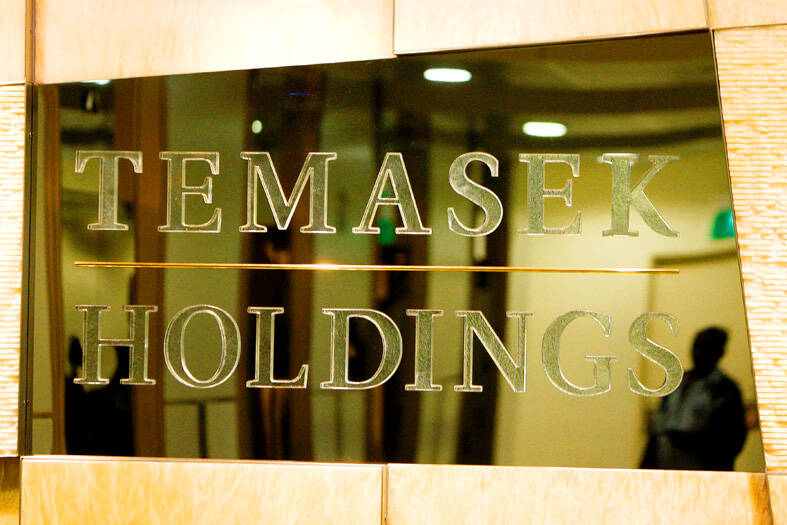Singapore’s state-owned Temasek Holdings Pte plans to invest US$30 billion in the US market over the next five years as the firm remains cautious about putting money into China.
“The Americas is going to be and continue to be the largest recipient of capital,” Temasek’s head of North America Jane Atherton said in an interview on Monday.
Temasek’s investments this year in North and South America surpassed China for the first time in at least a decade.

Photo: Reuters
Investment in the Americas now accounts for 22 percent, or US$63 billion, of its portfolio.
China investments make up 19 percent of the portfolio, and those in Singapore account for 27 percent.
The firm oversaw S$389 billion (US$289 billion) of assets as of March, up from S$382 billion a year earlier.
China and the US are vying to dominate semiconductor manufacturing because of its links to artificial intelligence (AI) and other aspects of the digital economy.
The US is trying to limit the rise of its Asian rival by deploying export controls and tariffs, and even considering a rule that would curb China’s access to advanced semiconductor technology.
That US-China strife has left investors navigating a geopolitical tripwire as they seek to capture a piece of one of the hottest sectors in the market.
Atherton said there are ways to structure investments around certain constraints, such as taking passive public equity stakes in listed semiconductor companies.
In China, Temasek has avoided investing in geopolitically sensitive areas, instead focusing on large domestic companies. It is looking to make new investments in electric vehicle makers and biotech firms.
“We make sure we are not investing in businesses that are in the crosshairs of geopolitical tensions,” Atherton said.
For the US, she said Temasek is looking to invest in AI-related firms, as well as semiconductor and infrastructure plays such as data centers and the companies that power them. It can gain exposure to data centers through its own real-estate subsidiaries — Mapletree Investments Pte and CapitaLand Group Pte — or by investing alongside private equity firms, Atherton said.
Temasek has grown its US assets fivefold in the past decade.

When an apartment comes up for rent in Germany’s big cities, hundreds of prospective tenants often queue down the street to view it, but the acute shortage of affordable housing is getting scant attention ahead of today’s snap general election. “Housing is one of the main problems for people, but nobody talks about it, nobody takes it seriously,” said Andreas Ibel, president of Build Europe, an association representing housing developers. Migration and the sluggish economy top the list of voters’ concerns, but analysts say housing policy fails to break through as returns on investment take time to register, making the

‘SILVER LINING’: Although the news caused TSMC to fall on the local market, an analyst said that as tariffs are not set to go into effect until April, there is still time for negotiations US President Donald Trump on Tuesday said that he would likely impose tariffs on semiconductor, automobile and pharmaceutical imports of about 25 percent, with an announcement coming as soon as April 2 in a move that would represent a dramatic widening of the US leader’s trade war. “I probably will tell you that on April 2, but it’ll be in the neighborhood of 25 percent,” Trump told reporters at his Mar-a-Lago club when asked about his plan for auto tariffs. Asked about similar levies on pharmaceutical drugs and semiconductors, the president said that “it’ll be 25 percent and higher, and it’ll

CHIP BOOM: Revenue for the semiconductor industry is set to reach US$1 trillion by 2032, opening up opportunities for the chip pacakging and testing company, it said ASE Technology Holding Co (日月光投控), the world’s largest provider of outsourced semiconductor assembly and test (OSAT) services, yesterday launched a new advanced manufacturing facility in Penang, Malaysia, aiming to meet growing demand for emerging technologies such as generative artificial intelligence (AI) applications. The US$300 million facility is a critical step in expanding ASE’s global footprint, offering an alternative for customers from the US, Europe, Japan, South Korea and China to assemble and test chips outside of Taiwan amid efforts to diversify supply chains. The plant, the company’s fifth in Malaysia, is part of a strategic expansion plan that would more than triple

Taiwanese artificial intelligence (AI) server makers are expected to make major investments in Texas in May after US President Donald Trump’s first 100 days in office and amid his rising tariff threats, Taiwan Electrical and Electronic Manufacturers’ Association (TEEMA, 台灣電子電機公會) chairman Richard Lee (李詩欽) said yesterday. The association led a delegation of seven AI server manufacturers to Washington, as well as the US states of California, Texas and New Mexico, to discuss land and tax issues, as Taiwanese firms speed up their production plans in the US with many of them seeing Texas as their top option for investment, Lee said. The